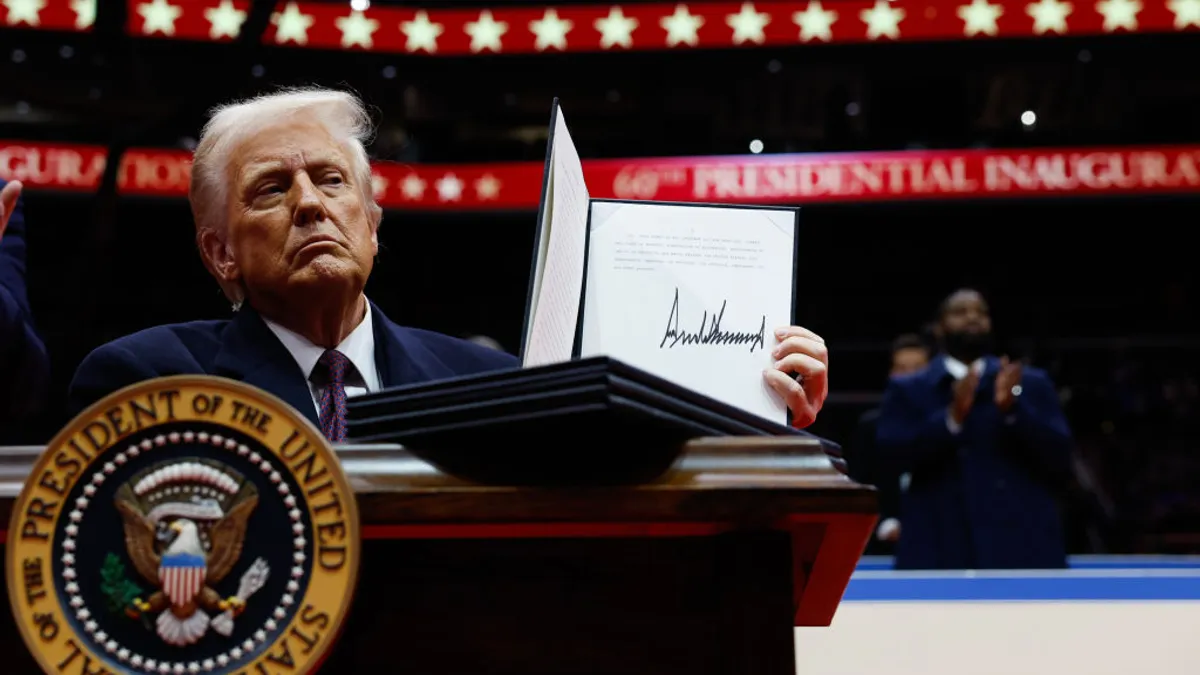Dive Brief:
- President Donald Trump issued an executive order to withdraw the United States from the Paris Agreement, among a flurry of other initial orders signed at a post-inauguration rally at Capital One Arena in Washington, DC on Monday.
- Though the official process of exiting the global climate treaty will take longer, the Jan. 20 order said the U.S. will consider its withdrawal from the agreement and any of its obligations “effective immediately.” The order also revokes and rescinds the U.S. International Climate Finance plan and directs the government to find any related financing; the White House web page on the plan is no longer available as of Tuesday afternoon.
- Trump exited the Paris Agreement during his first term, and the order fulfills a campaign trail promise to do so again. The decision signals an abrupt course of reversal on the nation’s federal climate policy and was followed by additional orders declaring a national energy emergency, recissions of Biden-era climate policies and encouraging energy exploration and production on federal lands and waters.
Dive Insight:
Monday’s executive order — labeled the “Putting America First in International Environmental Agreements” — from the freshly inaugurated president states the U.S. will inform the United Nations Secretary General that it intends to pull out of “any agreement, pact, accord, or similar commitment made under the United Nations Framework Convention on Climate Change.”
Trump said in the order that the United States’ “track record of advancing both economic and environmental objectives should be a model for other countries.” However, he said the U.S. has joined agreements that don’t reflect its “values or our contributions to the pursuit of economic and environmental objectives.”
“Over decades, with the help of sensible policies that do not encumber private-sector activity, the United States has simultaneously grown its economy, raised worker wages, increased energy production, reduced air and water pollution, and reduced greenhouse gas emissions,” the order said.
“These agreements steer American taxpayer dollars to countries that do not require, or merit, financial assistance in the interests of the American people,” Trump added.
The order requires the U.S. ambassador to the UN to work with the Secretaries of State and Treasury to work together to immediately halt or revoke any financial commitments made under the UNFCCC. The order also directs the head of the Office of Management and Budget to issue guidance for the frozen funds to be revoked within 10 days, and a variety of agencies are tasked with detailing their efforts to revoke or rescind funds related to the International Climate Finance Plan within 30 days.
“It is the policy of my Administration to put the interests of the United States and the American people first in the development and negotiation of any international agreements with the potential to damage or stifle the American economy,” Trump said.
The Jan. 20 order is reminiscent of the comments Trump made in 2017 when he said the Paris Agreement placed an “unfair economic burden” on American workers, businesses and taxpayers.
Trump signed a letter to the UN’s secretary general communicating the nation’s withdrawal and its reasoning at the post-inauguration rally immediately after. Prior to leaving office, former President Joe Biden had submitted the nation’s updated Nationally Determined Contribution target to the UN, targeting a 61-66% reduction in U.S. greenhouse gas emissions by 2035.
The We Mean Business Coalition — a nonprofit coalition whose membership includes Ceres, the Carbon Disclosure Project and World Business Council for Sustainable Development — said in a statement Monday that while the withdrawal is “deeply disappointing … one country’s decision does not change the global course of action.” The coalition said the nation’s “shifting policy direction discourages investment in America.”
“The U.S. federal government’s step away from international policy discussions that are shaping the clean energy future is a disservice to American businesses and people, opening the door for other major economies to attract greater investment and talent,” the coalition said.
Trump’s first day also included multiple national emergency declarations, including an energy emergency giving agencies and executive departments enhanced authority“ to facilitate the identification, leasing, siting, production, transportation, refining, and generation of domestic energy resources, including, but not limited to, on Federal lands.
The order defines energy and energy resources as “crude oil, natural gas, lease condensates, natural gas liquids, refined petroleum products, uranium, coal, biofuels, geothermal heat, the kinetic movement of flowing water, and critical minerals.”
A separate executive order, titled “Unleashing America’s Energy,” directs exploration and production of non-fuel minerals on federal lands and waters, including the outer continental shelf. The order includes a government directive to explore ways to “expedite and simplify” the permitting process.
That order also revokes 12 Biden-era executive orders related to the government’s role in tackling climate change, climate-related financial risk, clean in and environmental justice. They are among 78 orders or memorandums struck by the new administration on its first day, which also reversed a number of his predecessor's federal DEI initiatives.
















